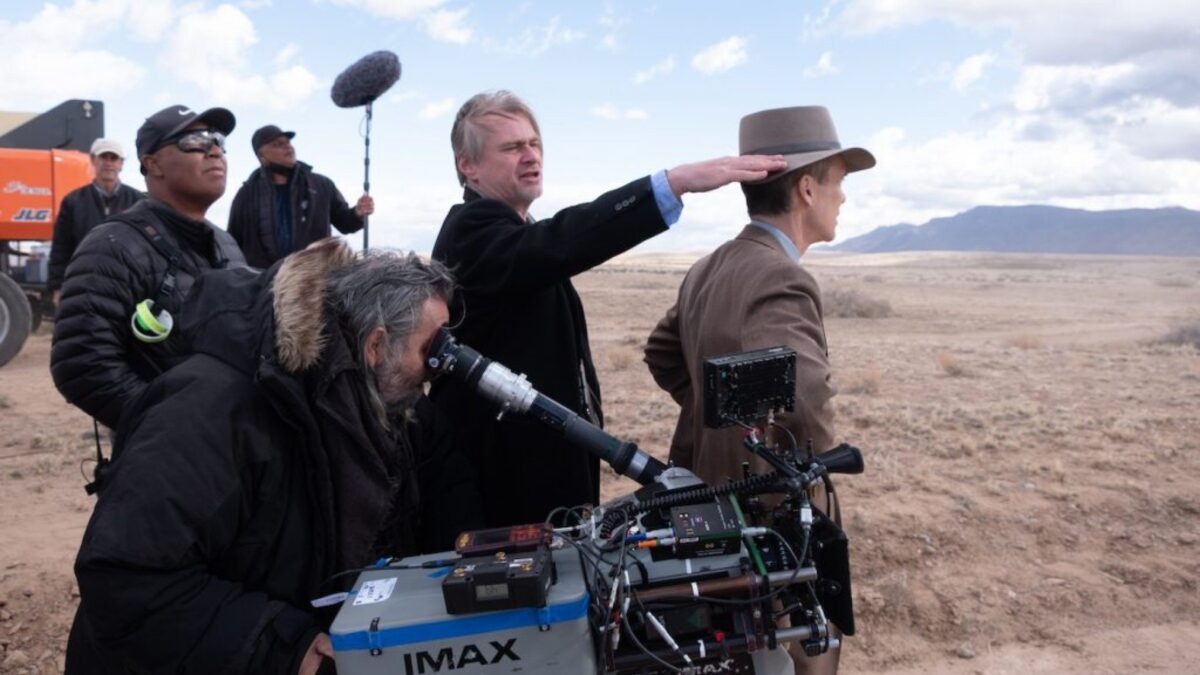
Is AI like the atomic bomb of our era?
It seems like every generation has some sort of technology that defines their era, but if you’re a millennial, it feels like we’ve been a part of such a huge tech boom that we’ve been defined and redefined half a dozen times. From the internet to social media to streaming and now to AI, things keep changing at an increasingly rapid pace.
During this whole time, we’ve seen filmmakers tackle stories involved in the present day, and some tell stories in the past that seem to echo now.
Christopher Nolan has been amidst all of these movements, from his spyware in The Dark Knight that seemed to harken to the Patriot Act to the environmental crisis in Interstellar that delivered a warning about the future of our planet, he’s someone with his finger on the pulse.
Now, his new movie, Oppenheimer, takes us back to the 1940s to look at the invention of the atomic bomb and the fallout from its creation.
What Does Oppenheimer Have to Say About the World Today?
For Nolan, it’s a movie about a creation that changes the course of human history that then haunted the rest of the years that followed with the Cold War and the increasing power humanity had to destroy itself.
In a recent interview with Wired magazine, Nolan talked about these implications. When the interviewer brought up AI, he balked at its likeness to the atomic bomb but did go into how it is changing the world.
At first, Nolan stated, “I think the relationship is an interesting one. It’s not the same. But it’s the best analogy—which is why I used it in Tenet—for the dangers of unthinkingly unleashing a new technology on the world. It’s a cautionary tale. There are lessons to be learned from it. Having said that, I do believe the atomic bomb is in a class of its own as far as technologies that have changed and endangered the world.”
But he also was willing to dissect the worry around AI and the public perception of the tool. Especially as people worry they’ll be out of jobs because of the technology.
Nolan said, “That’s part of the problem. Everybody has a very—call it a partisan point of view. The issue with AI, to me, is a very simple one. It’s like the term algorithm. We watch companies use algorithms, and now AI, as a means of evading responsibility for their actions.”
When prompted to expand on this, Nolan continued, “If we endorse the view that AI is all-powerful, we are endorsing the view that it can alleviate people of responsibility for their actions—militarily, socioeconomically, whatever. The biggest danger of AI is that we attribute these godlike characteristics to it and therefore let ourselves off the hook. I don’t know what the mythological underpinnings of this are, but, throughout history, there’s this tendency of human beings to create false idols, to mold something in our own image and then say we’ve got godlike powers because we did that.”
So, what, if anything, could AI be used for in filmmaking?
Nolan had an answer for that.
He said, “… The whole machine learning as applied to deepfake technology, that’s an extraordinary step forward in visual effects and in what you could do with audio. There will be wonderful things that will come out, longer term, in terms of environments, in terms of building a doorway or a window, in terms of pooling the massive data of what things look like, and how light reacts to materials. Those things are going to be enormously powerful tools.”

When asked if he would use AI personally, he gave a thoughtful answer.
“I’m, you know, very much the old analog fusty filmmaker. I shoot on film,” Nolan said. “And I try to give the actors a complete reality around it. My position on technology as far as it relates to my work is that I want to use technology for what it’s best for. Like if we do a stunt, a hazardous stunt. You could do it with much more visible wires, and then you just paint out the wires. Things like that.”
Nolan went on to explain even further, going into the idea of using AI for visual effects. He said, “It’s not starting from nothing. It’s starting from a much more detailed and data-driven idea. It might finally break the barrier between animation and photography. Because it’s a hybrid. If you tell an artist to, say, draw a picture of an astronaut, they’re inventing from memory or looking at references. With AI, it’s a different approach, where you’re actually using the entire history of imagery.”
I thought these were very thoughtful answers for a tool that feels like it is still in its infancy, but also for a filmmaker so intent on keeping cinema within our society. The truth is, we don’t have a lot of answers about AI because it is so new. That’s why it’s so important to protect human jobs right now, and then walk the fine line of learning how we can use AI to our advantage.
What did you think of Nolan’s responses? Let me know in the comments.














